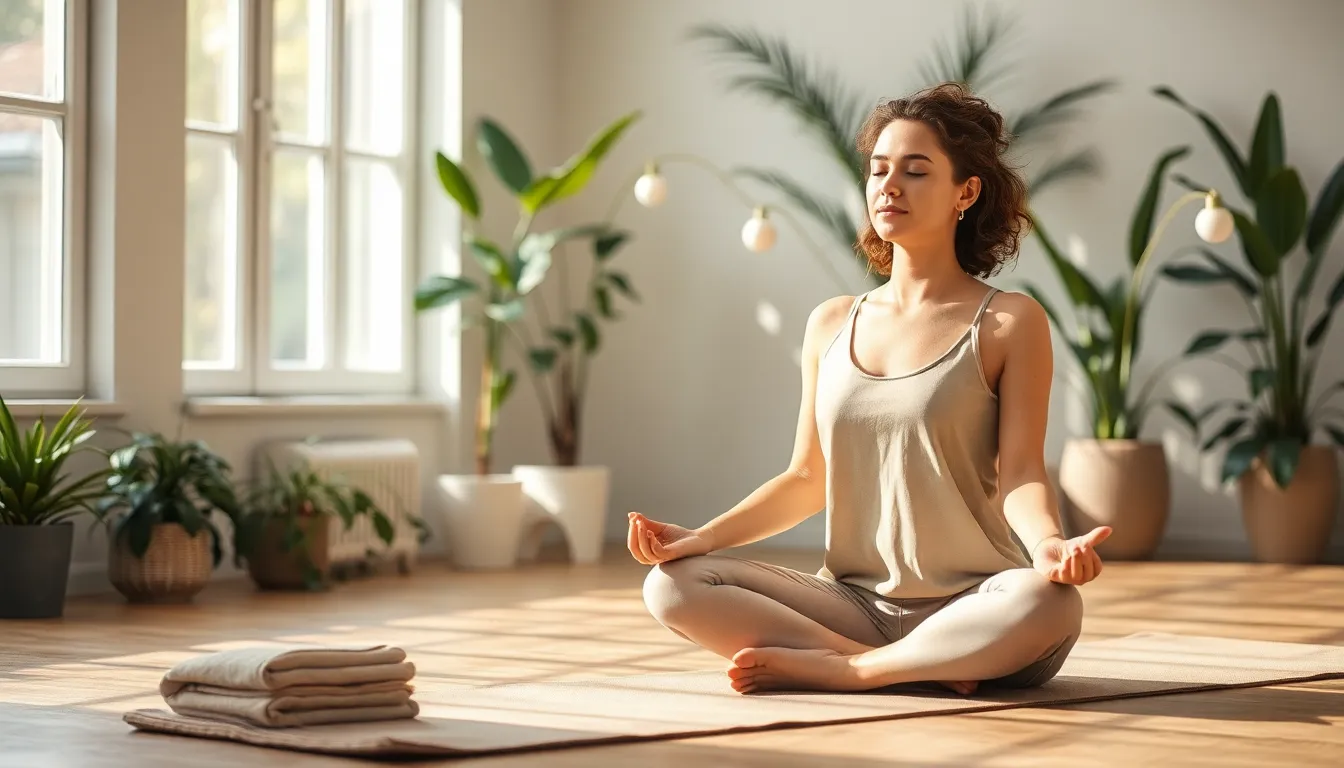In a world buzzing with chaos and deadlines, the idea of a peaceful life can feel like a distant dream—like finding a unicorn in your backyard. But what if achieving tranquility is more attainable than it seems? Imagine sipping your morning coffee without a care in the world, surrounded by serene landscapes and the sweet sound of silence. It’s not just a fantasy; it’s a lifestyle choice waiting to be embraced.
Living a peaceful life isn’t about escaping reality; it’s about mastering the art of balance. With the right mindset and a sprinkle of humor, anyone can transform their daily grind into a symphony of calm. So, grab your favorite mug and settle in, because this journey toward tranquility will make you laugh, reflect, and perhaps even inspire you to trade in that stress for a little zen.
Table of Contents
ToggleUnderstanding Peaceful Life
A peaceful life embodies tranquility and balance amidst life’s challenges. Seeking peace transforms everyday experiences into moments of calm.
Definition of Peaceful Life
A peaceful life focuses on inner tranquility and harmony. It emphasizes emotional stability, mental clarity, and physical wellness. Living peacefully means aligning thoughts and actions with core values. The absence of chaos leads to a more fulfilling existence. Individuals often discover the significance of mindfulness in creating this serene environment. Achieving peace also involves cultivating positive relationships, practicing gratitude, and embracing simplicity.
Importance of Peace in Daily Living
Peace plays a crucial role in enhancing overall well-being. It reduces stress levels and fosters better mental health. Individuals who prioritize peace experience greater levels of happiness and satisfaction. Incorporating peaceful practices into daily routines can lead to increased productivity and improved focus. A peaceful mindset encourages better decision-making and fosters resilience when faced with challenges. Embracing peace empowers individuals to navigate life’s complexities with grace.
Elements of a Peaceful Life

Achieving a peaceful life relies on several key elements that foster inner tranquility and emotional balance.
Mindfulness and Meditation
Mindfulness encompasses the practice of being fully present in the moment. Individuals can reduce anxiety and stress by focusing on their thoughts and feelings without judgment. Meditation serves as a powerful tool that enhances this awareness, allowing individuals to cultivate calmness and clarity. A consistent meditation practice, even for a few minutes daily, can significantly improve emotional stability and mental resilience. Numerous studies confirm that regular mindfulness practice leads to reduced stress levels and enhanced cognitive function.
Healthy Relationships
Building and nurturing healthy relationships is essential for a peaceful life. Positive interactions with family and friends contribute to emotional support and a sense of belonging. Individuals experience increased happiness when surrounded by caring and understanding people. Open communication fosters trust and deepens connections, essential for maintaining harmony. Engaging in quality time and shared experiences strengthens bonds, allowing for mutual growth and understanding, which contributes to overall well-being.
Simplifying Your Environment
Simplifying one’s environment plays a crucial role in creating a peaceful atmosphere. A clutter-free space promotes mental clarity and reduces distractions. Individuals can enhance their serenity by decluttering homes and workspaces, allowing for a more focused and organized lifestyle. Incorporating elements like plants or calming colors can elevate the sense of tranquility. Prioritizing essential items encourages mindfulness about possessions, ensuring that only meaningful items contribute to their sense of peace.
Benefits of Living a Peaceful Life
Living a peaceful life offers numerous benefits that promote well-being and overall happiness. Adopting tranquility leads to significant improvements in mental and physical health.
Mental Health Advantages
Mental clarity increases with a peaceful lifestyle. Reduced anxiety commonly results from mindfulness practices and meditation. Emotional stability fosters resilience, making it easier to handle life’s challenges. People who embrace tranquility often experience greater satisfaction and happiness. Improved focus and concentration emerge from a serene mindset, enabling individuals to perform better in daily tasks. Research from the American Psychological Association shows that lower stress levels contribute to enhanced mental health outcomes. These advantages create a positive feedback loop, further encouraging the pursuit of peace and serenity.
Physical Well-being
Physical health flourishes when one leads a peaceful life. Reduced stress leads to lower blood pressure and a decreased risk of heart disease. Immune function often improves, making it easier to ward off illnesses. Regular engagement in peaceful practices promotes better sleep quality. Additionally, relaxing environments can enhance energy levels throughout the day. Individuals frequently report improved digestion and reduced muscle tension. The World Health Organization highlights that improved mental health correlates with better overall health, emphasizing the importance of maintaining tranquility. Prioritizing peace ultimately contributes to a healthier lifestyle and enhanced longevity.
Tips for Cultivating a Peaceful Life
Cultivating a peaceful life involves making intentional choices that enhance tranquility. Below are effective strategies for integrating peace into daily routines.
Creating a Routine
Establishing a consistent daily routine enhances stability and promotes inner peace. Morning rituals such as meditation or stretching set a tranquil tone for the day. Incorporating regular breaks throughout the day reduces stress and improves focus. Evening practices like journaling or reading contribute to relaxation before bedtime. Individuals who structure their time tend to experience greater emotional resilience and clarity.
Embracing Nature
Connecting with nature offers significant benefits for mental well-being. Spending time outdoors reduces anxiety and fosters a sense of calm. Activities like walking in the park or gardening allow individuals to appreciate their environment. Nature’s sounds, sights, and scents invoke relaxation and enhance overall mood. Engaging with natural elements promotes mindfulness and reinforces a peaceful mindset.
Practicing Gratitude
Expressing gratitude shifts focus from negative to positive aspects of life. Daily reflections on things to be thankful for enhance emotional stability and happiness. Writing down three things to appreciate encourages a mindset of abundance. Acknowledging the support from friends and family fosters positive relationships. Regular gratitude practice cultivates a deeper sense of contentment and peace.
Embracing a peaceful life is within reach for everyone. By prioritizing mindfulness and nurturing positive relationships, individuals can create an environment that fosters tranquility. Simple practices like meditation and gratitude can transform daily routines, leading to enhanced emotional stability and mental clarity.
Choosing peace over chaos not only improves overall well-being but also cultivates resilience against life’s challenges. As individuals integrate these principles into their lives, they’ll discover that a serene existence is not just a dream but a fulfilling reality. The journey toward peace is a personal one, and every small step taken brings them closer to a harmonious life.





